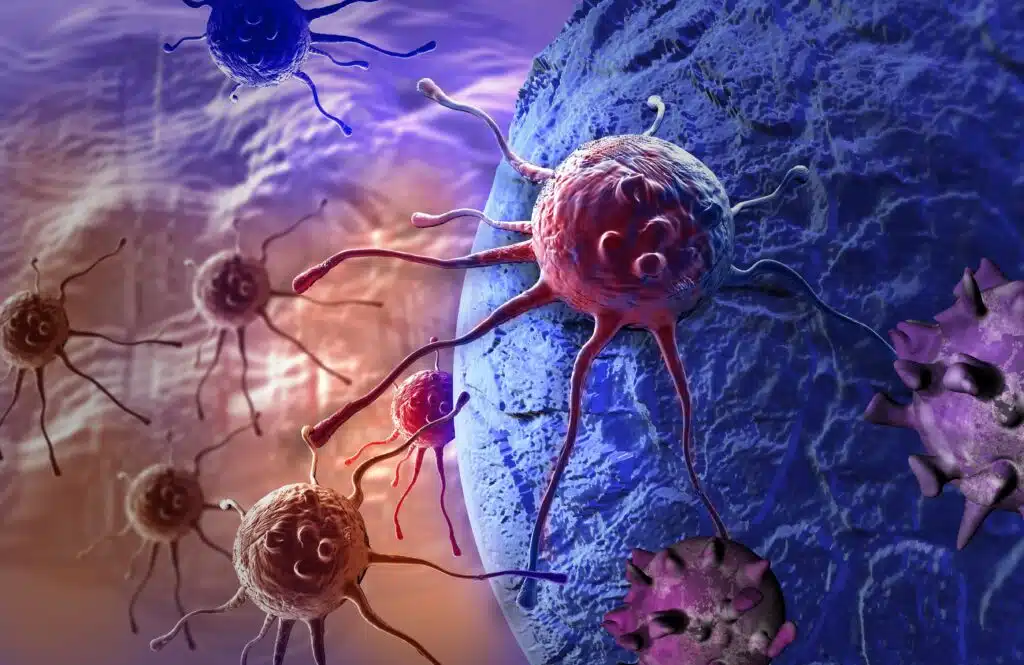Blood cancers like leukemia and lymphoma are caused by mutations in the DNA of blood cells. These mutations cause normal blood cells to change into cancer cells, but because they are mutated versions of a person’s own cells, the immune system fails to recognize and eliminate them. Gene therapy for blood cancer addresses this problem head-on, using modified T-cells to help the body’s own immune system identify and eradicate cancer cells, offering hope to patients with certain blood cancers resistant to conventional therapies.

Understanding CAR-T Gene Therapy for Blood Cancer
Chimeric antigen receptor T-cell (CAR-T) therapy is at the forefront of gene therapy for blood cancer research. In CAR-T therapy, a patient’s T-cells are modified to recognize and attack certain proteins that occur on cancer cells.
CAR-T Therapy Steps
CAR-T gene therapy for blood cancer is a process that begins with a care team meeting and evaluation to determine if a patient is eligible for CAR-T therapy. At present, CAR-T therapy is only approved by the FDA as a secondary treatment option. To be eligible, patients must have either experienced at least two cancer relapses after remission or must have never experienced remission after standard treatment, such as chemotherapy.
Once it is determined that a patient is eligible, the multi-phase CAR-T therapy process begins, starting with the following steps:
- The patient’s blood is collected. T cells are separated, and the person’s plasma and red cells are then returned to their body.
- In a laboratory, scientists add a manufactured chimeric antigen receptor (CAR) to the patient’s T cells, which allows the T cells to both recognize and bind to antigens on cancer cell surfaces. Vectors carrying genetic instructions that instruct normal T cells to turn into CAR-T cells are then delivered into the T cells.
- These modified T cells are allowed to grow and multiply in a lab setting. Once there are enough cells, they are frozen and returned to the outpatient infusion center or hospital, where the next stages of the process will occur.
- Prior to infusion, the patient will undergo lymphodepletion therapy, a type of chemotherapy that will create room for the engineered T cells to expand and multiply within the patient’s body.
- The modified T cells are then injected back into the patient’s bloodstream.
- After infusion, the patient is evaluated for side effects and response to treatment. This two-to-three-month recovery and monitoring period is when the patient may be most at risk for adverse and potentially serious side effects, such as cytokine release syndrome (CRS). The goal of CAR-T treatment is that the patient will go into remission during this phase.
CAR-T Therapy Risks and Challenges
Like any other therapy, CAR-T therapy may cause potentially serious side effects, including cytokine release syndrome (CRS). CRS causes the body to release a storm of cytokines, triggering a significant immune response. CRS symptoms can range from mild (fever, aches, flu-like symptoms) to severe and potentially life-threatening (organ failure). Prompt treatment is critical to prevent serious outcomes.
Other potential CAR-T therapy side effects include the following:
- Effects on the nervous system (tremors, confusion, trouble speaking/understanding, loss of balance, loss of consciousness)
- Abnormal levels of certain minerals in the blood
- Allergic reactions
- Heightened risk for infection
- Heightened risk for bruising or bleeding
Patients who receive CAR-T therapy are carefully monitored during the months following treatment so that any potential adverse side effects can be treated immediately.
The side effect risk is the reason that CAR-T therapy is currently only FDA-approved for patients with certain types of cancers that have not responded to traditional treatments. However, for these patients, CAR-T therapy can be a promising option.
Benefits and Future Implications
Today, there are six FDA-approved CAR-T therapies available for certain types of blood cancers: Abecma®, Breyani®, Carvykti®, Kymriah®, Tecartus®, and Yescarta®.
While in the clinical trial phase, both Kymriah® and Yescarta® had notable positive outcomes. In clinical trials for Yescarta®, which is for adults with certain forms of relapsed or refractory B-cell lymphoma, more than 80 percent of trial participants experienced either a partial response (reduction in the overall extent of cancer) or full remission (no signs of cancer).
In clinical trials for Kymriah®, which is also approved for people under the age of 25 with certain forms of leukemia, trial participants also experienced an 80-percent remission rate.
While researchers continue to collect data about the long-term effects of these therapies, there have been promising early data points: a 2022 study published in Nature demonstrated that two patients with chronic lymphocytic leukemia (CLL) who had received CAR-T therapy in 2010 remained cancer-free for 10 years. One of the study’s co-leaders, Carl June, professor of Pathology and Laboratory Medicine at the University of Pennsylvania, summarized, “We can now conclude that CAR T-cells can actually cure patients with leukemia.”
As research advances, scientists envision wider applications of CAR-T beyond hematology, extending to more varieties of cancer and other diseases. Efforts to reduce side effects and make the treatment more accessible are ongoing. But it is increasingly clear that CAR-T therapy may represent a hopeful paradigm shift in how certain cancers are treated.
QPS is a GLP- and GCP-compliant contract research organization (CRO) delivering the highest grade of discovery, preclinical and clinical drug research development services. Since 1995, it has grown from a tiny bioanalysis shop to a full-service CRO with 1,100+ employees in the U.S., Europe and Asia. Today, QPS offers expanded pharmaceutical contract R&D services with special expertise in neuropharmacology, DMPK, toxicology, bioanalysis, translational medicine and clinical development. An award-winning leader focused on bioanalytics and clinical trials, QPS is known for proven quality standards, technical expertise, a flexible approach to research, client satisfaction and turnkey laboratories and facilities. Through continual enhancements in capacities and resources, QPS stands tall in its commitment to delivering superior quality, skilled performance and trusted service to its valued customers. For more information, visit qpsoldstg.wpenginepowered.com or email info@qps.com.







